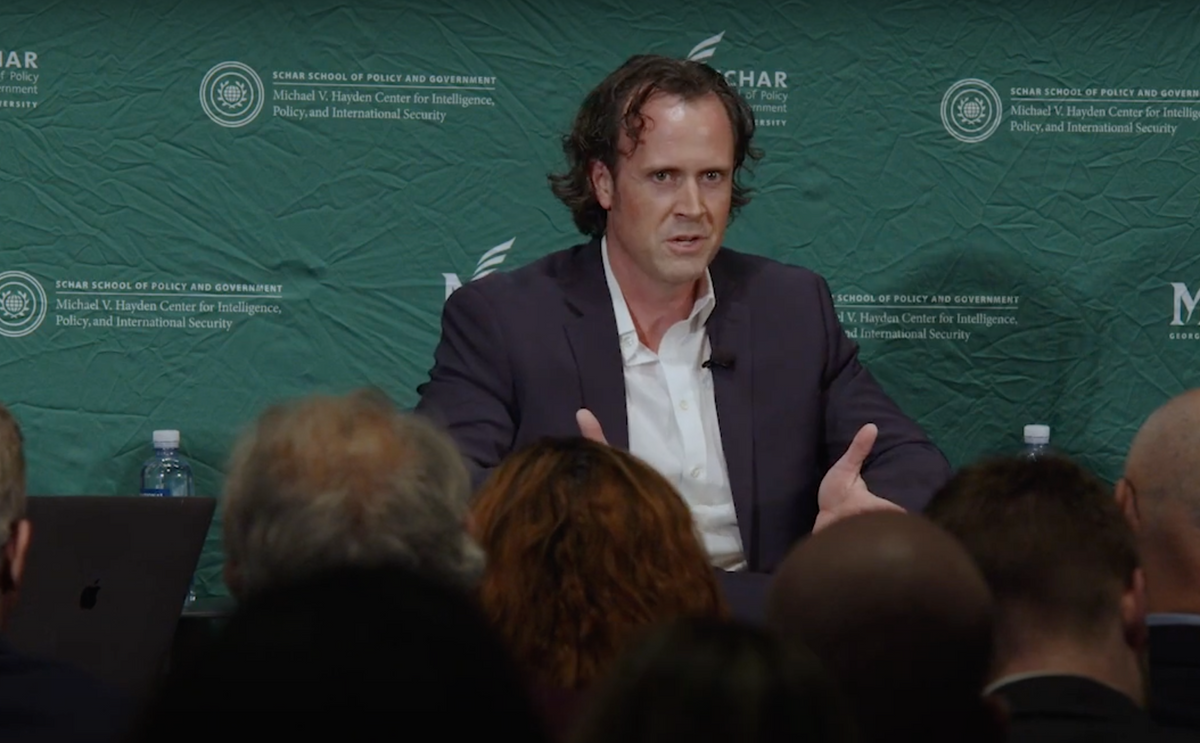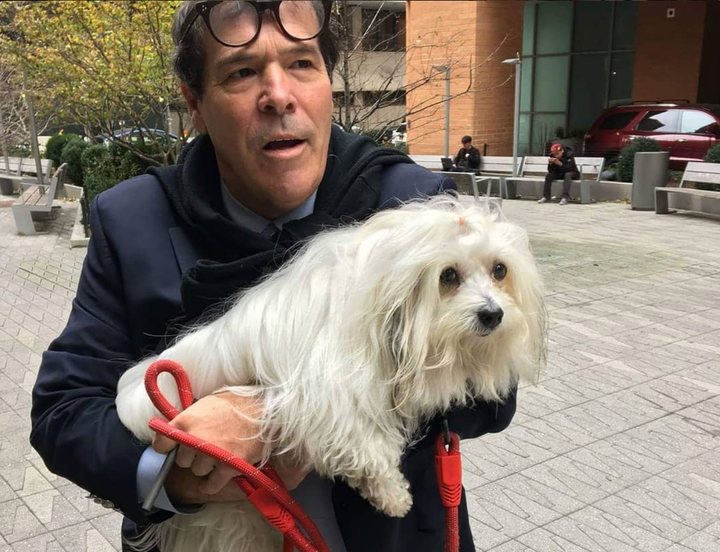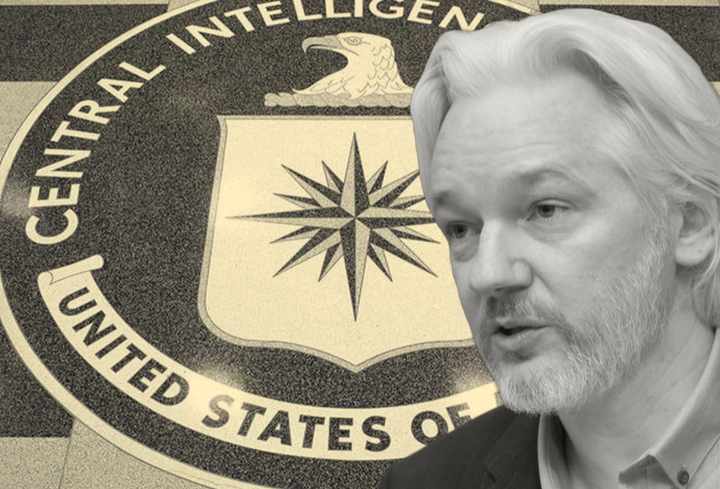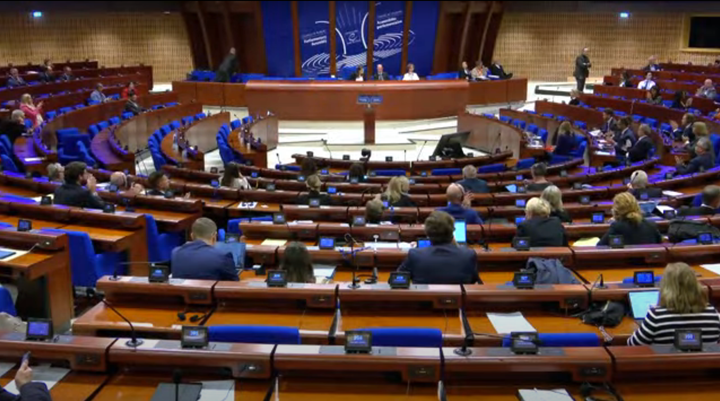Former CIA Director's Institute Hosts Event On The Assange Case (And Madness Ensues)

This article was funded by paid subscribers of The Dissenter Newsletter. Become a monthly paid subscriber to help us continue our independent journalism.
An institution founded by former CIA director Michael V. Hayden hosted a panel on WikiLeaks founder Julian Assange's case. They billed it as a debate over whether he was a “techno spy” or “modern day journalist" and drew the attention of several Assange supporters.
While press freedom advocates and Assange’s United States defense attorney held their own against misinformation spread at the event, US national security state defenders on the panel took the discussion far afield from the Justice Department’s allegations, with insinuations US prosecutors have not even made.
The wildest claims came from a former FBI official, who urged people not to focus on specifics while claiming WikiLeaks “smelled” like a Russian intelligence operation.
The Michael V. Hayden Center for Intelligence, Policy, and International Security is part of George Mason University. Hayden was the only person to head up both the CIA and the National Security Agency (NSA).
Hayden’s time at the NSA was marked by a dramatic expansion of the surveillance state. His legacy includes illegal warrantless surveillance of US citizens that violated not only the Fourth Amendment, but also the Foreign Intelligence Surveillance Act (FISA).
He was also notable for his suppression of criticism within the NSA and increased reliance on private, for-profit contractors. His tenure coincided with two of the biggest black eyes for the intelligence community—the 9/11 attacks, which they failed to prevent, and the Iraq War, where intelligence was manipulated to facilitate the case for a war of aggression.
The former CIA director has been an outspoken critic of WikiLeaks and Assange, and in the years following Hayden's tenure, the CIA reportedly planned to poison or kidnap Assange from the Ecuador Embassy in London. The CIA supported UC Global, a Spanish security company, as it engaged in a spying operation against Assange, associates, and those who visited him.
Given the center’s namesake (who announced he would be present in the audience), the panel on December 5, 2022, aroused quite a bit of skepticism from supporters of Assange.
The panel consisted of four individuals: Mark Zaid, Holden Triplett, Barry Pollack and Gabe Rottman. Pollack, Assange’s criminal defense attorney, and Rottman, who works for the Reporters Committee for Freedom of the Press, which opposes the use of the Espionage Act against journalists’ sources, were clearly meant to be sympathetic to the press freedom concerns about Assange’s prosecution.
Zaid, a whistleblower attorney notorious for his opposition to amending the Espionage Act and support for using the law against whistleblowers who give classified information to the media, and Triplett, an ex-FBI agent who currently runs a private consulting firm, were included to support or justify allegations in the indictment against Assange.
The anti-WikiLeaks speakers were aided by moderator Sasha Ingber, who is a national security correspondent for Newsy. Before working in journalism, she worked for the US State Department. Purportedly, her job involved “monitoring and debunking Russian disinformation.”
A decent chunk of the audience were local Assange activists, members of transparency and press freedom organizations, and independent journalists critical of the prosecution.
The Hayden Center stopped issuing free tickets and claimed they were “sold out,” even though the room was not at capacity.
'A Very Typical Tactic Of How Russian Intelligence Works'
While Pollack and Rottman stuck to the facts of the actual case of Julian Assange (or the legal issues it presented), Triplett did not, and he distinguished himself as the most strident and unhinged voice against Assange.
Asked to give his take on Pollack’s outline of the issues, Triplett stated he would not “litigate” the case. Instead, he insisted the panel should stay “on the wave tops” as opposed to getting into specifics.
Triplett’s view of the broad picture of the case was dramatically different from press freedom advocates. The former FBI agent consistently urged the audience to think about why the US government is concerned about WikiLeaks, as though the mere fact that the US government is opposed to WikiLeaks is proof that they are nefarious.
After saying that he did not know anything for certain, he exclaimed that WikiLeaks “smells like an intelligence operation to me.”
Triplett went further and stated that the convoluted saga where a Guardian reporter revealed a WikiLeaks password—which set off a chain of events in which unredacted State Department cables were published on the internet—was “a very typical tactic of how Russian intelligence works.”
At no point has the US government ever alleged that Russia was involved in the 2010-2011 publishing of war logs, diplomatic cables, and detainee assessments provided by US Army whistleblower Chelsea Manning.
Triplett served as Director of Counterintelligence for the National Security Council (NSC) from September 2017 to September 2018. This would mean his tenure potentially overlapped with the CIA's plot against Assange.
The CIA's actions were justified legally as “offensive counterintelligence” They were so outrageous that according to a Yahoo News investigation members of the National Security Council were deeply disturbed by their illegality. None of this was brought up during the panel.
'What Is Julian Assange's Relationship With Russia?'
Triplett’s Russian fixation was shared by Ingber, who previously worked for a State Department initiative aimed at Russian disinformation. Ingber asked Pollack about his client’s relationship with Russia.
Pollack replied that there was none and addressed misinformation about Assange that had been repeated by the panel. Then he proceeded to use the little time he had to talk about the facts of the case.
For the second time that evening, Ingber interrupted Pollack informing him that she was asking about Assange’s relationship with Russia and didn't want him to discuss anything else. Pollack told her he had already answered the question. There was no relationship.
Ingber’s tone made it clear that she did not accept that answer. She immediately announced she had a “follow-up” question for Triplett. Should WikiLeaks, like RT, be forced to register as a foreign agent? Triplett remarked that this was not one of the questions discussed beforehand, before saying it was an "interesting" question.
Rather than respond with any facts, the former FBI agent invited the audience to engage in a "thought experiment."
"If a Russian intelligence agency wanted to create a publisher that they could manipulate and use, what would that look like?" Triplett hypothesized. "Would that [publisher] get First Amendment protection? Could the GRU claim First Amendment protection?"
Triplett didn’t bother to answer his question or offer any specifics on the case, and the insinuation was clear. He believes WikiLeaks is an organization manipulated by Russian intelligence yet feels no responsibility to offer any proof when making such an insidious claim.
US prosecutors do not even make this allegation against Assange or WikiLeaks in their indictment.
Whitewashing The 'Collateral Murder' Video That Exposed A War Crime
Zaid, the other WikiLeaks opponent on the panel, stuck more closely to the actual facts. He argued that opposition to prosecuting Assange hinged on the claim that it created a "slippery slope" that could lead to legitimate news outlets being punished.
The implication was that Assange’s prosecution was legitimate, and the only concern is how its precedent may be applied to other media outlets. Yet Zaid asserted that WikiLeaks was different enough from other news outlets that there was no cause for concern.
The DC whistleblower attorney also argued just because information was in the public interest to publish does not mean it should be published. When it came to classified information, the government’s right to secrecy should triumph.
Zaid then used the "Collateral Murder" video as an example. Had Manning brought the video to him, he maintained that she would have gone through the proper channels. (Though that did not mean Zaid would have necessarily backed public disclosure of the video.)
As Zaid stressed, the Pentagon concluded the video did not depict a war crime. Since the Pentagon exonerated itself, the public had no right to know.
Zaid’s comments became more troubling as he contended when the US soldiers fired on "rescuers" of the Reuters journalists killed by a US gunship that was allowed under the laws of war.
Although Zaid did not define “rescuers,'' the Geneva Conventions expressly prohibits the targeting or capture of medical personnel. The former United Nations Special Rappatour on Torture Nils Melzer analyzed the video and found it depicted violations of the laws of war.
Even if the conduct depicted in the infamous Collateral Murder video was “legal” under the laws of war, it still depicted a shocking glimpse into the realities of war.
Two of the soldiers from the company implicated in the video, Ethan McCord and Josh Steiber, became opponents of the Iraq War because of the brutality inherent in the war. They both used the video's release to amplify their criticisms of the war.
Steiber chillingly told "Democracy Now!", “If we’re shocked by this video, we need to be asking questions of the larger system, because this is how these soldiers were trained to act.” Chelsea Manning, the source of the video, made it clear her purpose was to alert the American public about the nature of war—and thus spark a public debate.
Proper channels for whistleblowers are woefully inadequate, even under the best of circumstances. But when it comes to official policy, there are no real channels. One cannot go to an inspector general and tell them that war is violent or US trade policy favors multinational corporations at the expense of workers in the Global South.
Such policies can only be addressed through democratic accountability, and the American people cannot make decisions about whether to support wars or unfair trade policies if the US government hides key information from them.
[Note: This was part of the question I asked during the event. Predictably, the anti-Assange speakers on the panel blew me off. See the embedded tweet.]
A lot got lost in the Hayden Center Assange event. But @chipgibbons89 boiled the debate down to the core issue:
— Defending Rights & Dissent (@RightsDissent) December 6, 2022
"Does the American people have a right to know this information?" pic.twitter.com/pm8UuXtb4o
Longing For The Days Of J. Edgar Hoover's FBI
I am currently working on a book about the FBI's history of political surveillance in the United States. So during a reception after the panel, I approached Triplett to probe his worldview as a former FBI agent and national security bureaucrat.
When I approached, I discovered Triplett was having a heated conversation about the Steele Dossier and the application for a warrant against Carter Page under the Foreign Intelligence Surveillance Act (FISA). He told the two audience members they were engaged in “Russian disinformation.”
I mentioned to Triplett that the FBI had undeniably failed to follow its own internal procedures when applying for the Page warrant, and I brought up that those procedures were put in place, because in September 2000 the FBI confessed to the secret Foreign Intelligence Surveillance Court that it had misled them about 75 separate surveillance applications.
The FBI was caught lying on FISA applications. The Bureau was allowed to self-regulate, and then agents failed to follow their own regulations. I asked Triplett if this represented a pattern of abuse of power and lack of accountability.
Thankfully, Triplett did not accuse me of Kremlin talking points, but he disagreed. There was intense oversight of the FBI, he contended, and many FBI agents have gone to jail or lost their jobs (only two FBI agents have been convicted for civil liberties violations, neither was sentenced to jail time, and both were pardoned by President Ronald Reagan).
He then asked me if I knew how the FBI conducted national security wiretaps before the Foreign Intelligence Surveillance Act (FISA) was passed.
"Illegally," Triplett said. But only because there was no other choice. Triplett further maintained that the FBI could not have applied for warrants because the Soviets would have figured out they were after them.
This was shocking. Also, despite his absolute confidence, Triplett was wrong about the history of wiretapping.
From 1934 to the passage of the Omnibus Crime Control and Safe Streets Act of 1968, which created judicial warrants for criminal wiretaps, all wiretap evidence was inadmissible in federal court. The Department of Justice decided that since national security wiretaps did not gather evidence to be used in court they were not prohibited.
A process by which the Attorney General would approve wiretaps was created. For example, Attorney General Robert F. Kennedy approved a wiretap on Martin Luther King Jr.—and not to determine if he committed a crime but to decide whether he was being influenced by Communists.
Triplett denied all this history, and even stated incorrectly that the wiretap against King was not a national security wiretap. He then brought up the fact that his father was an FBI agent during this time. We had to avoid a narrative that treated men like his father and Hoover as a “gestapo,” they were good and honest men trying to help the country. They just needed the tools that were necessary.
I reminded Triplett of the Church Committee’s conclusion that the Bureau's abuses stemmed from their belief that they had a role in “maintaining the social order” and that they were “guardians of the status quo.”
That’s right, Triplett replied, before insisting that the Soviet Union had incited racial discord in the US by manipulating the civil rights movement. The FBI feared the social fabric of American society was unraveling. He made clear that many of the FBI’s actions against civil rights activists were bad, but repeated some of the worst Hoover-era disinformation in order to make clear they had pure motives.
Also, I mentioned the FBI's loose guidelines for surveillance in 2022. Given the FBI cannot tell civil right movements from Soviet influence or terrorism, thought all protesters were dangerous anarchists, and viewed all supporters of Palestinian rights as criminals, doesn't granting them too much power open the way for the agent’s own political bias to play a role in who they target.
No, Triplett answered. There were many good social movements, and the country benefited from them. However, Triplett argued that many protests are motivated by foreign influence designed to incite discord. The FBI has trouble distinguishing between legitimate protests and those inspired by foreign influence. And it was the FBI’s job to find out.
It was remarkable to meet an open Hooverite in 2022. Even more chilling, as recently as 2018, Triplett occupied an extremely important position on the National Security Council in President Donald Trump's administration.
***
Julian Assange is a journalist. He has been charged with 17 counts under the Espionage Act and one count of conspiracy to commit computer intrusion. The Espionage Act charges exclusively deal with information about US foreign given to WikiLeaks by Army whistleblower Chelsea Manning.
Assange and WikiLeaks worked with mainstream new organizations around the world to curate and release this information accompanied by groundbreaking and award winning reporting.
Although Assange’s persecution has aroused considerable anger across the world, it would be naive to suspect given the intensity of the US government’s hatred of Assange that no one in Official Washington or the national security establishment would defend his prosecution.
What is telling is that Assange's attorney was the panelist most eager to talk about the US government’s case against his client. And Assange’s biggest detractor on the panel refused to engage with the facts of the prosecution.
Simply put, the Department of Justice’s allegations are clearly indefensible.




Comments ()